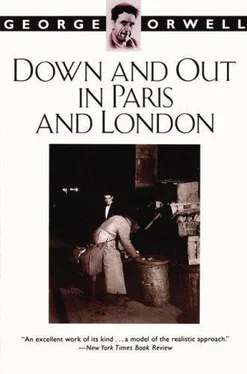George Orwell - Down and Out in Paris and London
Здесь есть возможность читать онлайн «George Orwell - Down and Out in Paris and London» весь текст электронной книги совершенно бесплатно (целиком полную версию без сокращений). В некоторых случаях можно слушать аудио, скачать через торрент в формате fb2 и присутствует краткое содержание. Жанр: Старинная литература, на русском языке. Описание произведения, (предисловие) а так же отзывы посетителей доступны на портале библиотеки ЛибКат.
- Название:Down and Out in Paris and London
- Автор:
- Жанр:
- Год:неизвестен
- ISBN:нет данных
- Рейтинг книги:5 / 5. Голосов: 1
-
Избранное:Добавить в избранное
- Отзывы:
-
Ваша оценка:
- 100
- 1
- 2
- 3
- 4
- 5
Down and Out in Paris and London: краткое содержание, описание и аннотация
Предлагаем к чтению аннотацию, описание, краткое содержание или предисловие (зависит от того, что написал сам автор книги «Down and Out in Paris and London»). Если вы не нашли необходимую информацию о книге — напишите в комментариях, мы постараемся отыскать её.
Down and Out in Paris and London — читать онлайн бесплатно полную книгу (весь текст) целиком
Ниже представлен текст книги, разбитый по страницам. Система сохранения места последней прочитанной страницы, позволяет с удобством читать онлайн бесплатно книгу «Down and Out in Paris and London», без необходимости каждый раз заново искать на чём Вы остановились. Поставьте закладку, и сможете в любой момент перейти на страницу, на которой закончили чтение.
Интервал:
Закладка:
poverty, is on the fringe of it. Six francs is a shilling,
and you can live on a shilling a day in Paris if you know
how. But it is a complicated business.
It is altogether curious, your first contact with
poverty. You have thought so much about poverty - it
is the thing you have feared all your life, the thing you
knew would happen to you sooner or later; and it is all so
utterly and prosaically different. You thought it would be
quite simple; it is extraordinarily complicated. You
thought it would be terrible; it is merely squalid and
boring. It is the peculiar
lowness of poverty that you
discover first; the shifts that it puts you to, the
complicated meanness, the crust-wiping.
You discover, for instance, the secrecy attaching to
poverty. At a sudden stroke you have been reduced to an
income of six francs a day. But of course you dare not
admit it-you have got to pretend that you are living
quite as usual. From the start it tangles you in a net of
lies, and even with the lies you can hardly manage it.
You stop sending clothes to the laundry, and the
laundress catches you in the street and asks you why;
you mumble something, and she, thinking you are
sending the clothes elsewhere, is your enemy for life.
The tobacconist keeps asking why you have cut down
your smoking. There are letters you want to answer, and
cannot, because stamps are too expensive. And then
there are your meals-meals are the worst difficulty of
all. Every day at meal-times you go out, ostensibly to a
restaurant, and loaf an hour in the Luxembourg
Gardens, watching the pigeons. Afterwards you smuggle
your food home in your pockets. Your food is bread and
margarine, or bread and wine, and even the nature of the
food is governed by lies. You have to buy rye bread
instead of household bread, because the rye loaves,
though dearer, are round and can be smuggled in your
pockets. This wastes you a franc a day. Sometimes, to
keep up appearances, you have to spend sixty centimes
on a drink, and go correspondingly short of food. Your
linen gets filthy, and you run out of soap and razor-
blades. Your hair wants cutting, and you try to
cut it yourself, with such fearful results that you
have to go the barber after all, and spend the equivalent
of a day's food. All day you are telling lies, and
expensive lies.
You discover the extreme precariousness of your six
francs a day. Mean disasters happen and rob you of
food. You have spent your last eighty centimes on half a
litre of milk, and are boiling it over the spirit lamp.
While it boils a bug runs down your forearm; you give
the bug a flick with your nail, and it falls, plop! straight
into the milk. There is nothing for it but to throw the
milk away and go foodless.
You go to the baker's to buy a pound of bread, and
you wait while the girl cuts a pound for another cus-
tomer. She is clumsy, and cuts more than a pound.
"Pardon, monsieur," she says, "I suppose you don't mind
paying two sous extra?" Bread is a franc a pound, and
you have exactly a franc. When you think that you too
might be asked to pay two sous extra, and would have
to confess that you could not, you bolt in panic. It is
hours before you dare venture into a baker's shop again.
You go to the greengrocer's to spend a franc on a
kilogram of potatoes. But one of the pieces that make up
the franc is a Belgium piece, and the shopman refuses
it. You slink out of the shop, and can never go there
again.
You have strayed into a respectable quarter, and you
see a prosperous friend coming. To avoid him you dodge
into the nearest café. Once in the café you must buy
something, so you spend your last fifty centimes on a
glass of black coffee with a dead fly in it. One could
multiply these disasters by the hundred. They are part
of the process of being hard up.
You discover what it is like to be hungry. With bread
and margarine in your belly, you go out and look
into the shop windows. Everywhere there is food in-
sulting you in huge, wasteful piles; whole dead pigs,
baskets of hot loaves; great yellow blocks of butter,
strings of sausages, mountains of potatoes, vast Gruyère
cheeses like grindstones. A snivelling self-pity comes
over you at the sight of so much food. You plan to grab a
loaf and run, swallowing it before they catch you; and
you refrain, from pure funk.
You discover the boredom which is inseparable from
poverty; the times when you have nothing to do and,
being underfed, can interest yourself in nothing. For half
a day at a time you lie on your bed, feeling like the jeune
squelette in Baudelaire's poem. Only food could rouse
you. You discover that a man who has gone even a week
on bread and margarine is not a man any longer, only a
belly with a few accessory organs.
This-one could describe it further, but it is all in the
same style-is life on six francs a day. Thousands of
people in Paris live it-struggling artists and students,
prostitutes when their luck is out, out-of-work people of
all kinds. It is the suburbs, as it were, of poverty.
I continued in this style for about three weeks. The
forty-seven francs were soon gone, and I had to do what
I could on thirty-six francs a week from the English
lessons. Being inexperienced, I handled the money
badly, and sometimes I was a day without food. When
this happened I used to sell a few of my clothes, smug-
gling them out of the hotel in small packets and taking
them to a second-hand shop in the Rue de la Montagne
St. Geneviève. The shopman was a red-haired Jew, an
extraordinary disagreeable man, who used to fall into
furious rages at the sight of a client. From his manner
One would have supposed that we had done him some
injury by coming to him. « Merde! » he used to shout,
'you here again? What do you think this is? A soup
kitchen?" And he paid incredibly low prices. For a hat
which I had bought for twenty-five shillings and.
scarcely worn he gave five francs; for a good pair of
shoes, five francs; for shirts, a franc each. He always
preferred to exchange rather than buy, and he had a
trick of thrusting some useless article into one's hand
and then pretending that one had accepted it. Once I
saw him take a good overcoat from an old woman, put
two white billiard-balls into her hand, and then push
her rapidly out of the shop before she could protest. It
would have been a pleasure to flatten the Jew's nose, if
only one could have afforded it.
These three weeks were squalid and uncomfortable,
and evidently there was worse coming, for my rent
would be due before long. Nevertheless, things were not
a quarter as bad as I had expected. For, when you are
approaching poverty, you make one discovery which
outweighs some of the others. You discover boredom and
mean complications and the beginnings of hunger, but
you also discover the great redeeming feature of poverty:
the fact that it annihilates the future. Within certain
limits, it is actually true that the less money you have,
the less you worry. When you have a hundred francs in
the world you are liable to the most craven panics. When
you have only three francs you are quite indifferent; for
three francs will feed you till to-morrow, and you cannot
think further than that. You are bored, but you are not
Читать дальшеИнтервал:
Закладка:
Похожие книги на «Down and Out in Paris and London»
Представляем Вашему вниманию похожие книги на «Down and Out in Paris and London» списком для выбора. Мы отобрали схожую по названию и смыслу литературу в надежде предоставить читателям больше вариантов отыскать новые, интересные, ещё непрочитанные произведения.
Обсуждение, отзывы о книге «Down and Out in Paris and London» и просто собственные мнения читателей. Оставьте ваши комментарии, напишите, что Вы думаете о произведении, его смысле или главных героях. Укажите что конкретно понравилось, а что нет, и почему Вы так считаете.












